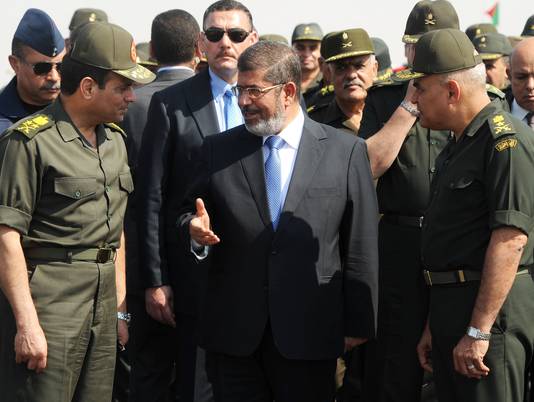
Last month, after large-scale protests in the Suez Canal region, President Mohamed Morsi declared a state of emergency, imposing a curfew across three major cities in the area. Army tanks rolled into Suez, Port Said and Ismailia, to enforce Morsi’s decision. Instead, residents of these cities engaged in late night festivities in a willful, and successful, attempt to break the curfew. They organized soccer championships and had their photos taken in front of the governorate headquarters, while in the background, soldiers stood, puzzled and helpless
After the fall of Mubarak, a new authoritarian regime emerged in Egypt, coming out of an apparent alliance between the Muslim Brotherhood and the military institution. Egypt’s new authoritarianism musters the same qualities of Mubarak’s autocracy: one ruling party, a neo-liberal economy, favoritism of a select business elite, and police brutality. However, despite its many attempts, this new authoritarianism lacks an essential element that Mubarak’s enjoyed: Fear.
The Muslim Brothers and the army generals sealed their alliance with the text of the newly issued constitution. Last December, an Islamist-dominated committee drafted and passed through a public referendum a constitution that grants the military semi-autonomous status over its affairs. An important source of the military institution’s independent supremacy within the state is its vast economic empire of profitable enterprises, whose budget is kept secret from public accountability. Article 197 in the new constitution maintains the military budget— even aspects concerning revenue from civilian businesses —above state oversight and public scrutiny.
The constitutionally sealed alliance restored the main elements of Mubarak’s authoritarianism. The Brotherhood’s Freedom and Justice Party (FJP) has replaced Mubarak’s National Democratic Party (NDP) as the single ruling party, while its members are rapidly replacing former NDP officials in key posts as ministers, governors, heads of governmental organizations, and more. The loyalties of the media, justice, interior, finance, provincial development, labor, and youth and sports ministers lean towards the Brotherhood. In addition, Morsi modified the trade union law in order to place the “Egyptian Federation of Trade Unions”— previously dominated by NDP members— under FJP control.
The FJP’s economic policy keeps Gamal Mubarak’s neo-liberalism intact. This includes extending economic reforms that eliminate state subsidies and raise the prices of basic goods on the poor, and allow the business elite to enjoy subsidized energy and low taxes. As Gamal forged a patron-client relation between the NDP and select business tycoons, allowing them to benefit from the openness of the market, FJP has fostered similar relations with the Muslim Brothers business elite. In addition, the FJP co-opted a considerable number of Mubarak-era business tycoons who have displayed a certain degree of religiosity or allegiance. This has been conspicuously obvious with Muslim Brotherhood businessmen accompanying Morsi on international trips to seek partnership with foreign investors.
Meanwhile, the military institution continues to control and expand its large economic enterprises of civilian production in almost every sector. Since the new Minister of Defense, General Abdel Fattah al-Sisi, assumed his position last August, the budget of the military institution’s many economic enterprises remain a well-kept secret. Last November, the head of the state’s Central Auditing Organization confirmed that he has no access to the accounts of military-owned businesses, even when it comes to the army’s many wedding halls, the accounts of which have no relation to national security in order to justify the secrecy. The new constitution places the authority to oversee the military budget in the hands of the National Defense Council, a governmental body consisting mainly of military officers internally nominated. The parliament must consult the same council on any future laws relevant to the armed forced before they are issued.
Attempting to amass more property, in a recent incident military soldiers invaded Qursaya, an island in Giza inhabited by peasants and fishermen, and tried to take a claim on the land. The Qurasaya’s impoverished peoples violently resisted the armed invasion. A legal dispute with the military over the land dates back to 2007, and Qursaya’s residents won a court case in 2010 giving them legal rights as tenants of the state-owned land. However, last month, army soldiers attacked the island, leaving one resident dead and 25 others facing military trials.
As the new authoritarian regime uses military tanks to deter rioters, applies excessive police brutality in dealing with protesters, targets activists, and attempts to restrain an independent media, it is not feared. Instead, they have become the subject of ridicule. Khairat al-Shater, the Brotherhood’s Deputy Supreme Guide, is known in Egypt as el-baqqal (the grocer), a name derived from the fact that his economic enterprise is made up mainly of hypermarkets. The military has not been spared. It is often referred to as jaysh al-makaruna (the pasta army), a name derived from the fact that it is involved in the production of civilian goods, the likes of which most armies would not be engaged in, including canned foods and pasta.
Thus, when the Port Said curfew was imposed, all three Canal cities flouted it, waiting until 9pm on the dot, to take to the streets in celebration. Those same streets filled with army tanks. Nobody takes the new dictators seriously.
Zeinab Abul-Magd is an Assistant professor of Middle Eastern history at Oberlin College and the American University in Cairo.
Photo: AP
Image: Morsi%20Military%20AP.jpg
